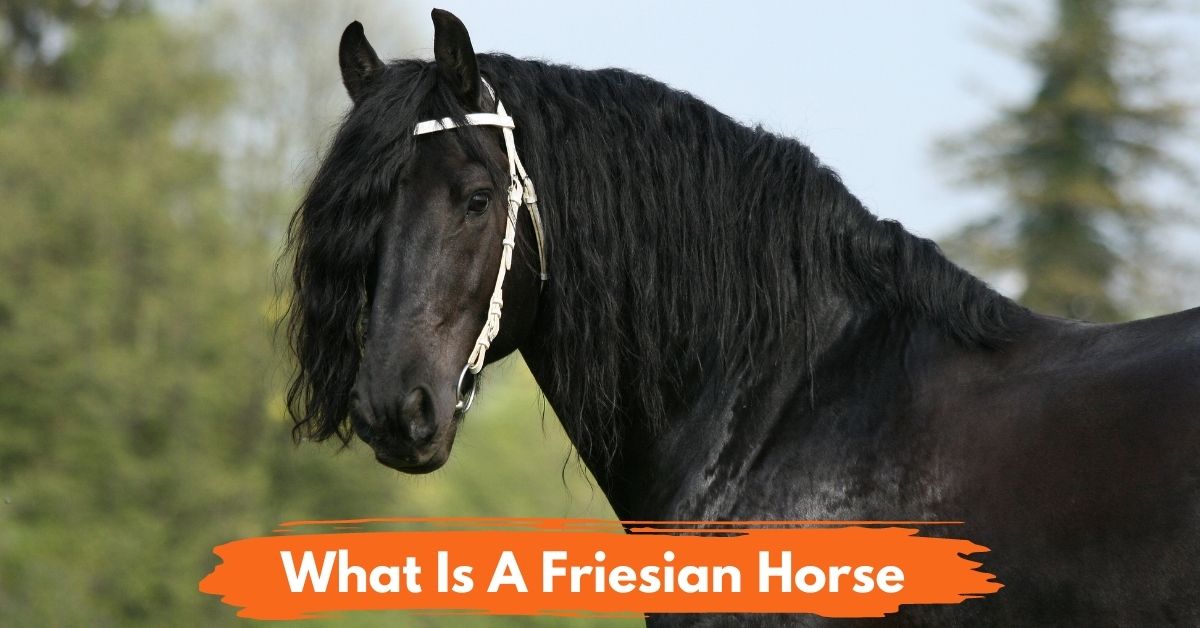
What is a Friesian horse? The Friesian horse is a breed of large, black horses that originated in the Netherlands. While it resembles a draught horse, it’s quite different.
The Friesian horse has a high-stepping gait and elegant appearance. It has a friendly and docile personality, which makes it a popular choice for riding.
The Friesian horse was a workhorse. But, Friesian horses nowadays have become popular as sport and pleasure horses. They are often used in dressage, driving, and other English riding disciplines.
So, what sets Friesian horses apart from other horse breeds? Let’s dive deep and learn more about this majestic horse and its unique qualities.
Friesian Horse History
The Friesian Horse is among the oldest horse breeds in the world, dating back to the 13th century. It originated in Friesland, a province in the northern Netherlands.
The Friesian horse was used in battle, providing service for Friesian knights during war. They later became status symbols for wealthy farmers and upper class people in the 17th century.
Friesian horses were a common choice for carriage because of their elegant appearance.
The Friesian breed almost went extinct before World War I due to a decrease in demand for workhorses. In fact, by the mid-part of the 1900s, the worldwide population of Friesian horses was at 500.
A few Friesian breeders in the Netherlands kept the breed alive. They bought the remaining quality purebred, saving the Friesian breed and increasing their numbers through the years.
Today, the Friesian horse has recovered completely. It is now exported to other countries and is one of the most popular breeds in the world.
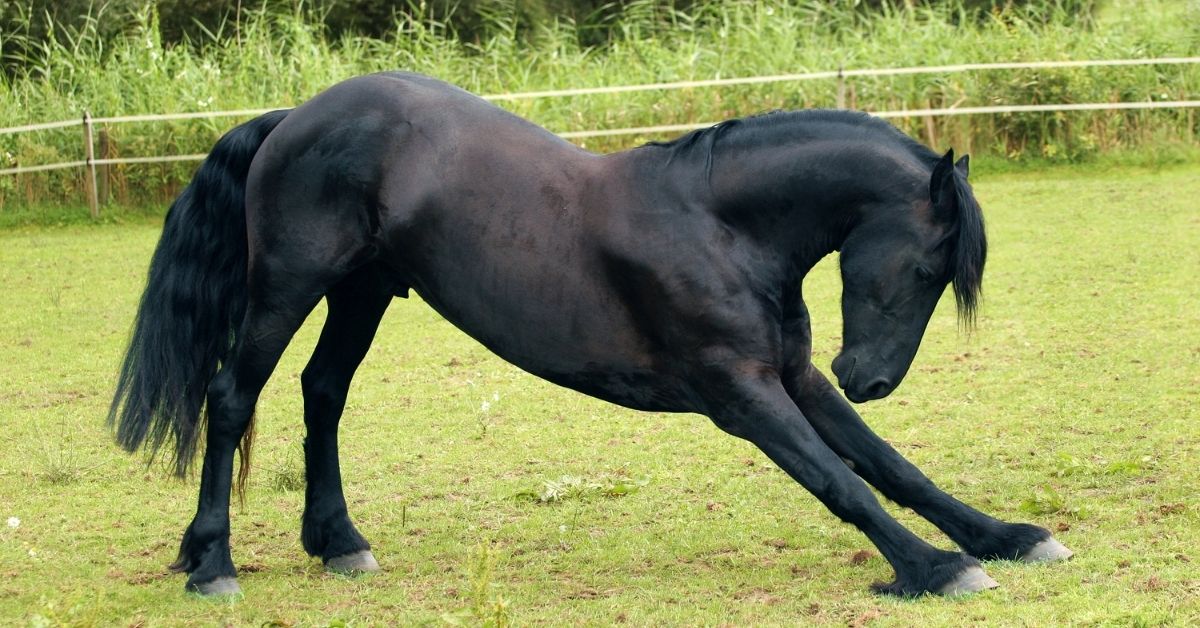
What is a Friesian Horse?
The Friesian Horse refers to the breed of large horses that come from the Netherlands. Friesian horses are recognizable by their long manes, tails, and rich and thick coat.
They stand between 15 and 17 hands high and can weigh up to 1,500 pounds. Their height and weight averages make them some of the largest horses in the world.
Friesian horses are also known for their high-stepping gait and elegant appearance. Its physical appearance makes beautiful Friesian horses majestic and attractive creatures.
Friesian Horse Breed Characteristics
Friesian horses might look intimidating due to their large size. But the truth is that this breed is actually very gentle and docile by nature.
This, combined with their beauty, makes Friesian horses popular. They are often used in dressage and other English riding disciplines.
Warm-blooded, the Friesian horse is also known for its intelligence. They are always willing to learn and are quick to pick up new things.
Despite their large size, Friesian horses are also known for their agility. This energetic horse is very light on its feet and can make quick turns.
Friesian horses are also very calm, which means they don’t spook easily. This breed tends to read situations very well instead of overreacting to things.
Friesian horses are also very friendly. They want to be the center of attraction and are always looking to please everyone. This trait is why Friesian horses are great for competitions.
Due to these characteristics, Friesian horses are also very easy to train and are suitable for a range of riders.
Friesian Horse Colors
The Studbook registration of the Friesian horse excludes any color other than black. The Friesian horse has a range of coat colors. But black is the only color the Friesian horse breed associations recognize.
Friesian horses have three main coat colors: jet black, raven black, and brown-black. Raven black is the most common Friesian horse coat color, followed by jet black. Brown black Friesian horses are the least common.
The most common Friesian coat colors are black, white, gray, brown, and the rare chestnut. They can also have combinations of said colors and can even sport the red coat.
White Friesian Horse
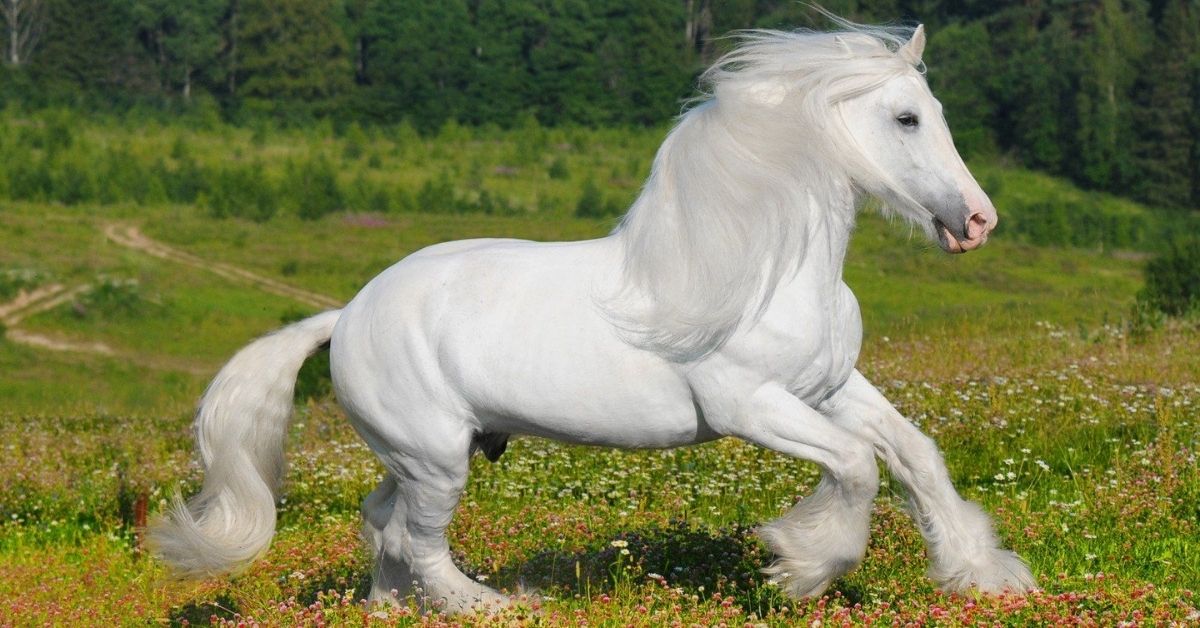
White Frisian horses are not purebred Friesian horses. Instead, they combine a Friesian and another breed, usually a warmblood or draft horse.
For instance, a white Friesian Horse can be 76% Friesian and 24% Arabian.
This combination makes them a mix of two breeds. Since they have a Friesian bloodline, they are still considered as Friesian horses.
White Friesian horses appear to look like actual Friesian breeds. The only takeaway is the white coat. They will either be all-white or have white patches on their coat.
Black Friesian Horse
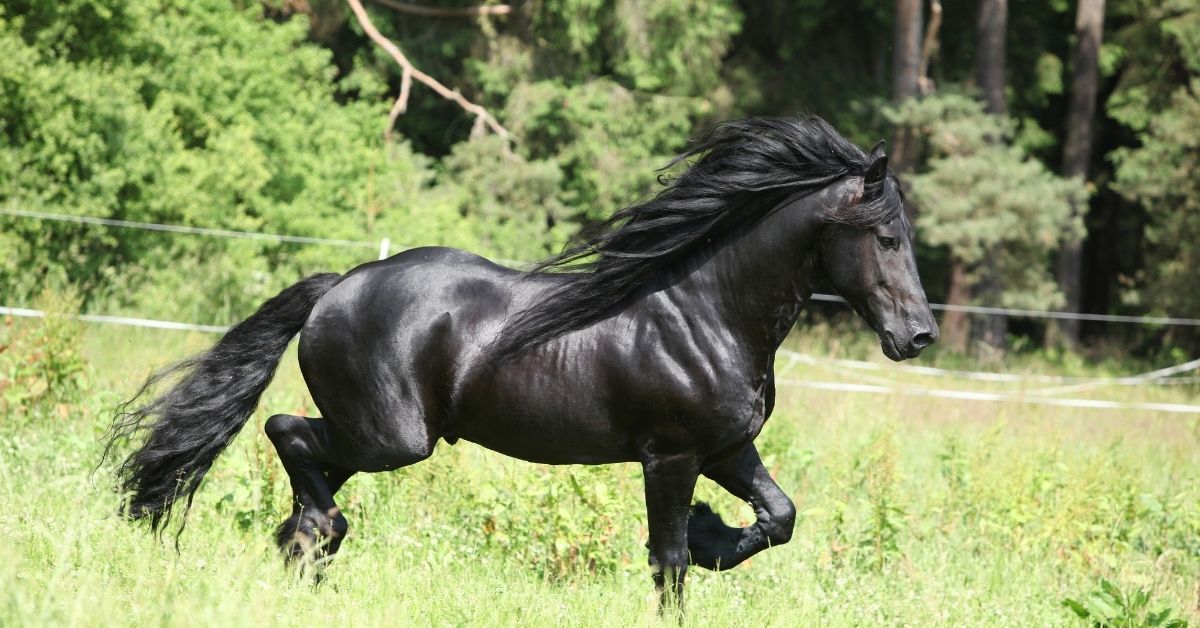
The black variant is the Friesian horse in its purest form. This coat color is what Friesian horses are most known for. And it’s the only Studbrook-registered Friesian horse coat color.
If you plan to buy a registered purebred Friesian horse, you can expect it to be black. If it’s a different color, then the horse you’re purchasing isn’t a purebred Friesian.
Gray Friesian Horse
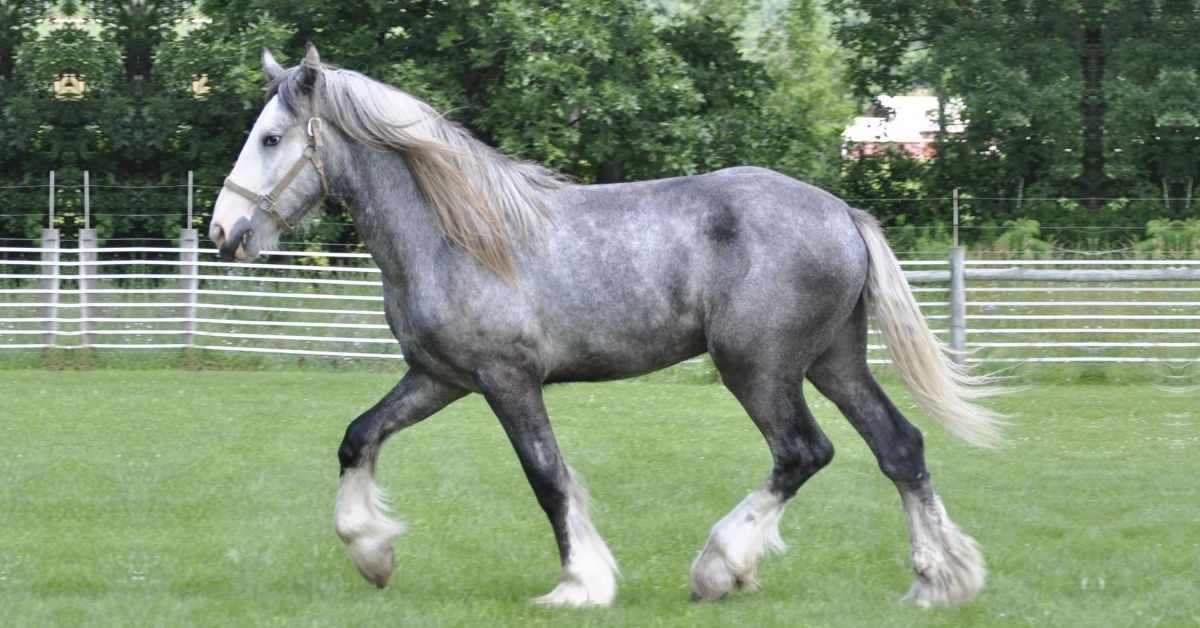
Like the white Friesian horse, the gray Friesian horse is not a purebred Friesian. Instead, it’s the result of crossbreeding a Friesian horse with another breed.
Gray Friesian Horses are as majestic as they come. They have the same stunning features as the Black Friesian horse but with a sleek gray coat.
Brown Friesian Horse
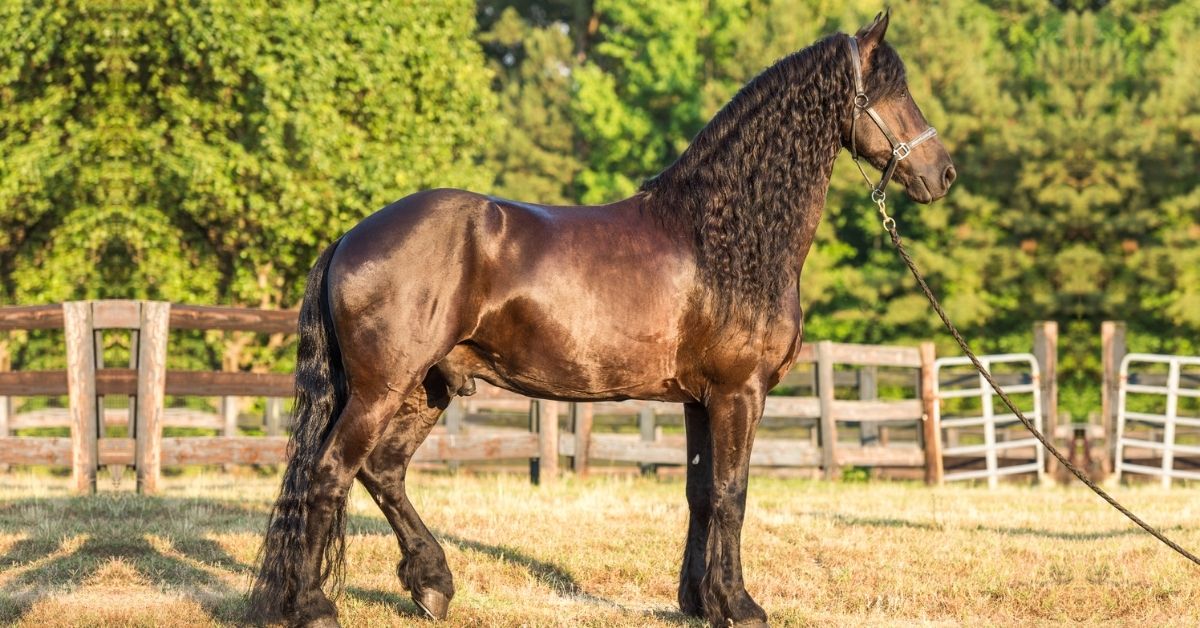
The brown variant is the third most common non-black Friesian coat color. Brown Friesians are cross variants.
But, there are instances of purebred Friesian horses having dark brown coats.
Brown Friesian horses look like standard Friesian horses but with a dark brown coat. The coat may also have a few light brown or blond highlights throughout.
Chestnut Friesian Horse
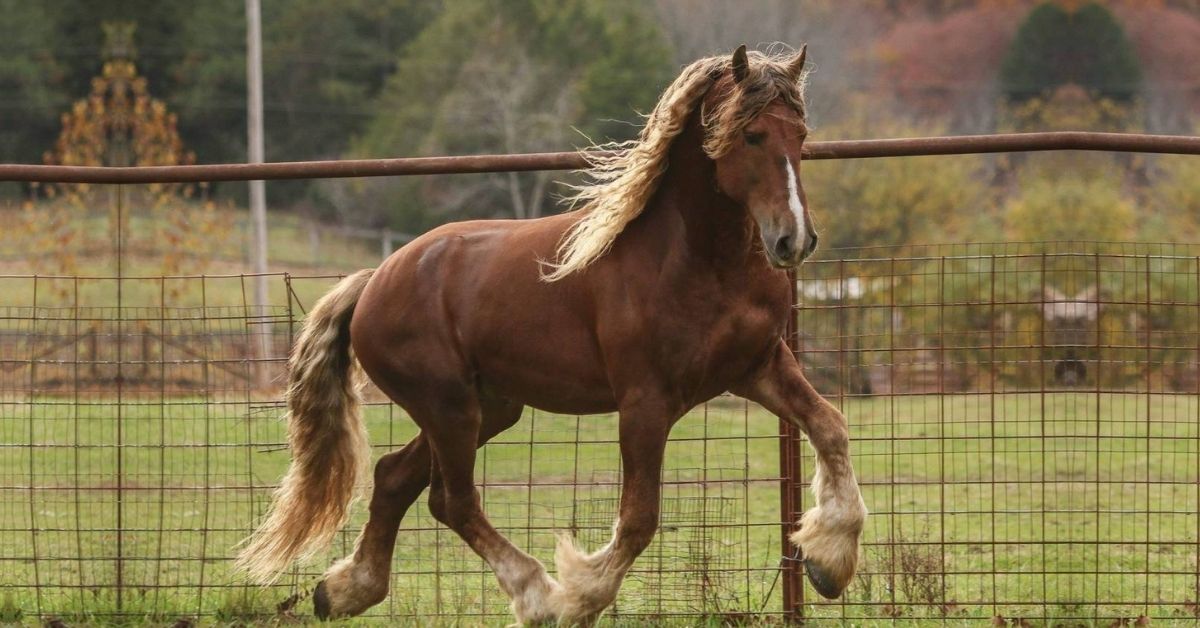
Finally, we have the rarest Friesian coat color: the chestnut Friesian horse. Chestnut Friesian horses are not common, but they are a unique Friesian coat color. These Friesian horses have a reddish-brown coat with lighter highlights throughout.
You can distinguish a pure Friesian breed by its black coat. But, some bloodlines that carry the red gene can produce chestnut Friesian horses.
This instance is why chestnut Friesian horses are so rare. The occurrence of this coat is random instead of intentional.
But, for this to have a chance of occuring, your Friesian horse needs to have the red gene.
Is a Friesian Horse High Maintenance?
Yes, Friesian horses tend to be high maintenance. This type of horse has a different look and behavior from other breeds. As a result, they need special care and attention.
For instance, their thick mane and tail need daily brushing to prevent tangles. Their glossy coat will need weekly grooming to maintain their luster.
Friesian horses are also known to be high-strung, so they need experienced riders.
Friesian horses don’t look high maintenance—they are high maintenance. If you’re not prepared to take the time and effort to take care of a Friesian horse, consider other equine breeds.
Genetic Disorders Associated with Friesian Horses
Purebred Friesian horses are the highest class of their kind. Inbreeding is often necessary to maintain a healthy population of purebred Friesian horses.
While inbreeding can preserve the Friesian bloodline, it also comes with some risks. Inbreeding leads to genetic disorders.
Friesian horses have a small gene pool to work with. That’s why inbreeding increases the chances of disorders passing down to purebred foals.
Some of the most common genetic disorders associated with Friesian horses include:
Dwarfism
The most common disorder associated with Friesian inbreeding is dwarfism. Normal Friesian horses have a large, muscular frame.
But, when you inbreed Friesians, it can lead to dwarfism. This condition stunts the growth of the Friesian horse.
Dwarfism is a serious condition that can cause Friesian horses to suffer from:
- Mobility issues
- Respiratory problems
- Feeding difficulties.
Friesian horses with severe dwarfism get put down to prevent further suffering.
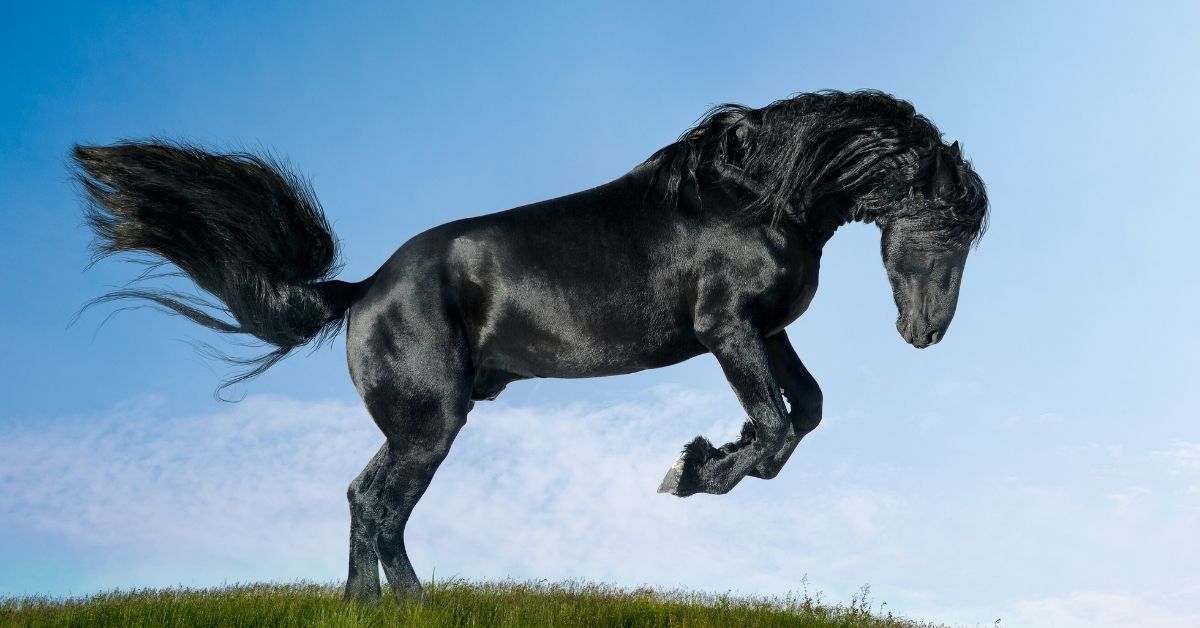
Megaesophagus
Another common Friesian inbreeding disorder is the megaesophagus. This condition affects the Friesian horse’s ability to digest food .
Megaesophagus is a malformation of the Friesian horse’s esophagus. The esophagus is the tube that transports food from mouth to stomach.
This condition prevents the horse from being able to chew and swallow food . As a result, they are at risk for malnutrition and dehydration. In severe cases, Megaesophagus can be fatal.
Hydrocephalus
Hydrocephalus is a condition that affects the Friesian horse’s brain. This condition is an abnormal buildup of fluid in the Friesian horse’s brain. This condition puts pressure on the Friesian horse’s brain, leading to neurological problems.
Friesians with hydrocephalus suffer from a diminished level of consciousness. They tend to lose mobility and appear like they’re in a coma.
The good news is that this disorder is uncommon in Friesian horses. But while the odds are quite low, there’s still a slight chance it could occur.
Weaker Immunity
As with any inbred population, Friesian horses are at risk for weakened immunity. They are more susceptible to diseases and infections than other horse breeds.
To protect Friesian horses from diseases, ensure they are up-to-date on their vaccinations. You should also keep your Friesian horses in clean and sanitary living conditions. Doing so will prevent the spread of disease.
While this may be the case, it doesn’t always guarantee that they can’t live long and healthy lives. With proper care, purebred Friesian horses can enjoy a long and prosperous life.
Aortic Artery Rupture
Aortic artery rupture is a serious disorder associated with Friesian inbreeding. This condition occurs when the Friesian horse’s aorta ruptures. The aorta is the largest artery in the Friesian’s body,
Aortic artery rupture is a life-threatening condition. It can cause Friesian horses to bleed to death.
While aortic artery rupture is serious, it’s important to remember that it’s rare. The vast majority of Friesian horses will never experience this condition.
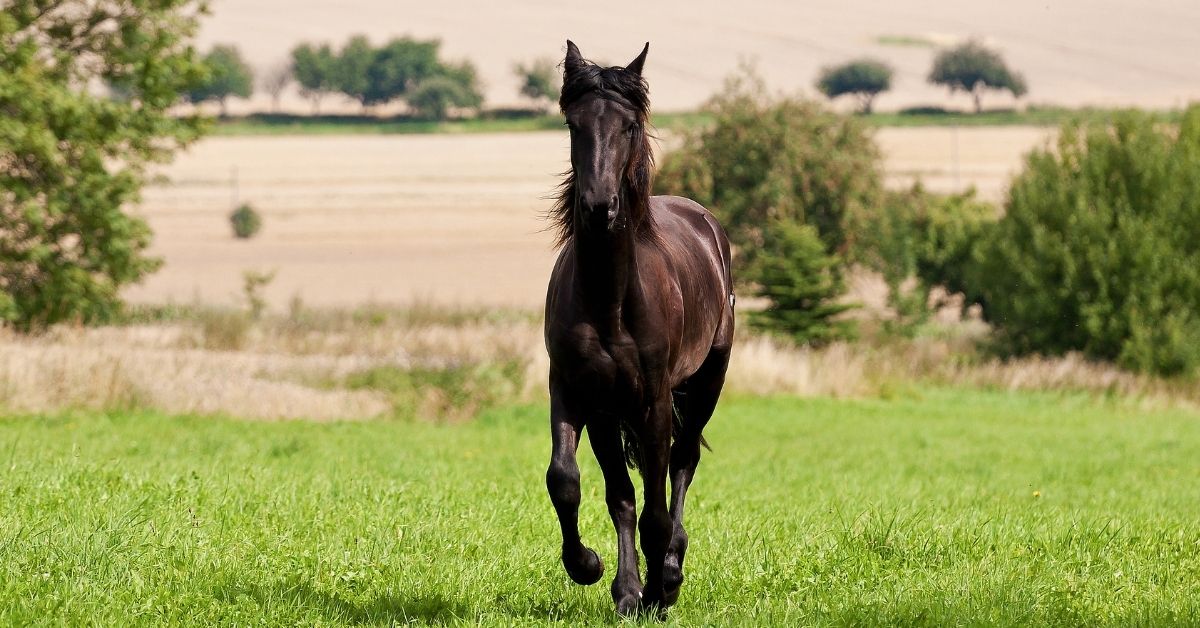
Do Friesians Make Good Dressage Horses?
Yes! Friesians make excellent dressage horses. Dressage is a discipline that emphasizes control and elegance. It’s both an art and a sport.
Friesian horses exemplify grace and beauty, which makes them perfect for dressage. Friesian horses are often used in dressage exhibitions and competitions.
Friesian horses have a natural affinity for the discipline. This is due to their calm and willing nature. Friesian horses are also very intelligent which makes it easy to train them.
A Friesian horse is a great choice if you’re looking for a horse that excels in dressage.
How Much Does a Friesian Horse Cost?
Friesian horses are quite expensive, ranging from $3,000 to $30,000. The price can even go as high as $25,000 to $50,000. The latter price is for horses that are KFPS-registered. KFPS stands for Koninklijke Vereniging “Het Friesch Paarden-Stamboek”.
The KFPS registrations is a voluntary registration system for Friesian horses. The registration allows Friesian owners to track their horse’s lineage. It also serves as proof of parentage.
Friesian horses with KFPS registrations are more expensive. But buyers can guarantee that they are of high quality.
To register for KFPS, Friesian horses must meet certain standards. This includes standards for conformation, movement, and character.
If you’re looking for a high-quality Friesian horse, you can expect to pay more. But it’s worth it in the end!
How Tall is a Friesian Horse?
The average Friesian horse is between 15 and 17 hands tall. Some Friesian horses can even go as tall as 18 hands. This height range makes Friesian horses some of the tallest horse breeds in the world.
Friesian horses are also very heavy, ranging from 1,200 to 1,400 pounds. These metrics make Friesian horses one of the largest horse breeds in the world.
But as you already know by now, their stature can be misleading as Friesian horses are gentle giants. They may be large and in charge, but they’re also kind-hearted and gentle.
Conclusion
That’s everything you need to know about Friesian horses! As you can see, they’re one-of-a-kind and make excellent companion animals.
This horse is loyal to its family and will always be by your side. Whether you’re competing in dressage or going for a leisure ride, your Fresian will be with you. So, if you’re looking for a beautiful, intelligent, and loving horse, look no further.
Bet expect to pay more, as Friesian horses are quite expensive. But as they say, you get what you pay for!
So, if you want a high-quality horse that offers years of companionship, then a Friesian horse is the way to go.
